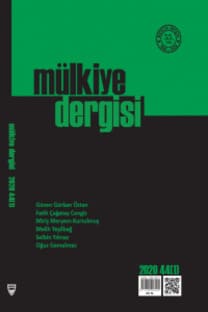Kaybolan Anlamı Ararken:Arendt'in Düşüncesinde Öznellik
Bu çalışma Hannah Arendt'in siyaset kuramındaki özne sorunsalına odaklanmaktadır. Doğrudan öznellik meselesini sorun edinmemesine rağmen, Arendt modern çağda 'siyasal eylem' sorununa odaklandığında eylemin faili olarak özneyi sorunsallaştırır. İnsanlık Durumu çalışması, modern çağdaki insanın bir tür portresini sunar ve aktif yaşam içinde bireyin varoluşunu ele alır. Arendt için öznenin modern ve postmodern kavramsallaştırmaları arasındaki ikilik yeterli değildir; diğer bir deyişle, egemen ve özerk özne ile tabi kılınmış özne arasında bir seçim yapmak zorunda olmadığımızı göstermeyi hedeflemektedir. Arendt özneyi ne bütün olası eylemlerin merkezine koyarak ne de hiçbir eyleme yetisinin olmadığı şeklinde pasifleştirerek; herhangi bir yapıya, söyleme, ideolojiye veya hegemonik sürece de maruz bırakmadan 'merkezsiz' kılmıştır. Böylece özne sorunsalına 'öteki'yi de dâhil ederek öznelliği 'çoğullukta özne' olarak kavramsallaştırmış ve öznenin ancak öteki ile kurulacak 'pozitif' ve 'somut' bir ilişki aracılığıyla var olabileceğini göstermeye çalışmıştır. Bu bağlamda bu çalışma Arendt'in özne, öteki, özgürlük ve siyasal eylem kavramları aracılığıyla siyasal olanın ve yeni bir dünya inşa edebilmenin olanaklarının sorgulanmasına katkı sunmak amacındadır
In Pursuit of the Meaning:The Problem of Subjectivity in Arendt's Thought
This paper focuses on the notion of subjectivity in the political thought of Hannah Arendt. Although she did not problematize the subjectivity directly, when thinking on the problem of 'political action' in the modern age, she examines the subject as the agent of action. The work of The Human Condition presents a kind of portrait of the individual in the modern age and deals with the existence of the individual in active life which is asserted as vita activa. For Arendt, the dichotomy between modern and postmodern versions of the subjectivity is not satisfying. In other words, she aims to point out that we do not have to make a choice between self-sovereign and autonomous subject and the subjected subject. She has decentralized the subject without subjugating it to any other structure, discourse, ideology or hegemonic process according to which the subject is neither at the exact centre of all possible action nor is completely passive with having no capacity to act. In this way, she conceptualizes subjectivity as 'subject in plurality' through integrating the 'other' to the conceptualization and tries to disclose that the subject can exist only through a 'positive' and 'concrete' relationship with the other. In this sense, this study aims to contribute to the examining of the political and the possibilities of constructing a new world through the notions of subject, other, freedom and political action
___
- Arendt H (2005). The Promise of Politics. Der. J Kohn, New York: Schocken Books.
- Arendt H (1961). Between Past and Future: Eight Exercies in Political Thought. New York: The Viking Press.
- Arendt H (2012a). Geçmişle Gelecek Arasında. İstanbul: İletişim Yayınları.
- Arendt H (2012b). Devrim Üzerine. İstanbul: İletişim Yayınları.
- Arendt H (1959). The Human Condition. New York: Doubleday Anchor Books.
- Arendt H (2009). İnsanlık Durumu. İstanbul: İletişim Yayınları.
- Arendt H (2014). Kötülüğün Sıradanlığı: Adolf Eichmann Kudüs’te. İstanbul: Metis Yayınları.
- Arendt H (1992). Lectures on Kant’s Political Philosophy. Chicago: The Univ. Chicago Press.
- Arendt H (1997). Rahel Varnhagen: The Life of a Jewess. London: John Hopkins Univ. Press.
- Arendt H (1962). The Origins of Totalitarianism. New York: Meridian Books.
- Arendt H (1978). Willing. İçinde: The Life of the Mind (ikinci cilt). New York: A Harvest Book.
- Arendt H (1994). Essays in Understanding: Formation, Exile, and Totalitarianism. J Kohn (der.), New York: Schocken Books.
- Arendt H (1968). Men in Dark Times. New York: A Harvest Book.
- Benhabib S (1996). The Reluctant Modernism of Hannah Arendt. California: Sage Publications.
- Benhabib S (1988). Judgment and the Moral Foundations of Politics in Arendt’s Thought. Political Theory 16, no 1, 29-51.
- Buckler S (2011). Hannah Arendt and Political Theory: Challenging the Tradition. Edinburgh: Edinburgh Univ. Press.
- Butler J (2011). Precarious Life and the Obligations of Cohabitation. Nobel Museum’da sunulan ders, Stockholm.
- Canovan M (1995). Hannah Arendt: A Reinterpretation of Her Political Thought. New York: Cambridge Univ. Press.
- Critchley S (2010). Sonsuz Talep: Bağlanma Etiği, Direniş Siyaseti. İstanbul: Metis Yayınları.
- Disch L J (1994). Hannah Arendt and the Limits of Philosophy. New York: Cornell Univ. Press.
- Demirkent D (2015). Anayasal Kuruluş Konusunda Kapanmayacak Tartışma: Hannah Arendt ve Carl Schmitt’te Kurucu İktidar Sorunu. Mülkiye Dergisi, 39(3), 87-120.
- D’Entereves M.P (1994). The Political Philosophy of Hannah Arendt. London: Routledge.
- Dolan F M (1995). Political Action and the Unconscious: Arendt and Lacan on Decentering the Subject. Political Theory 23, no 2, 330-352.
- Gambetti Z (2005). The Agent is the Void! From the Subjected Subject to the Subject of Action. Rethinking Marxism 17, no 3, 425-437.
- Gambetti Z (2007). Marx ve Arendt: Emek, İş ve Eylem Üzerinden Üç Siyaset Biçimi. Birikim, no 217, 46-54.
- Hall D E (2004). Subjectivity. New York: Routledge.
- Honig B (1988). Arendt, Identity and Difference. Political Theory 16, no 1, 77-98.
- Horkheimer M ve Adorno T (2002). Dialectic of Enlightenment. California: Stanford Univ. Press.
- Swift S (2009). Hannah Arendt. New York: Routledge.
- Taylor C (2001). Sources of the Modern Self: The Making of the Modern Identity. Massachussets: Harvard Univ. Press.
- Topolski A (2011). The Ethics and Politics of Teshuvah: Lessons from Emmanuel Levinas and Hannah Arendt. The University of Toronto Journal Jewish Thought 2 (elektronik makale).
- Topolski A (2015). Arendt, Levinas and A Politics of Relationality. London: Rowman & Littlefield International.
- Villa Dana (1996). Arendt and Heidegger: The Fate of the Political. New Jersey: Princeton Univ. Press.
- Young-Bruehl E (2004). Hannah Arendt: For Love of the World. London: Yale Univ. Press.
- Yoder J (2009). The Case of Human Plurality: Hannah Arendt’s Critique of Individualism in Enlightenment and Romantic Thinking. Saarbrücken: VDM Verlag Dr. Müller.
- ISSN: 1305-9971
- Yayın Aralığı: Yılda 4 Sayı
- Başlangıç: 1965
- Yayıncı: Mülkiyeliler Birliği Genel Merkezi
